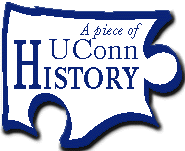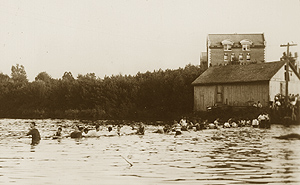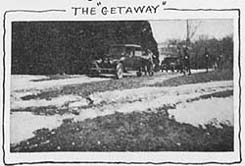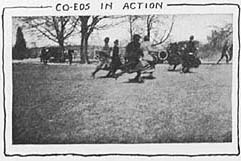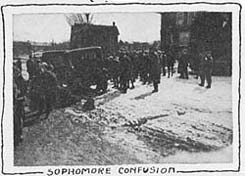This is an archived article. For the latest news, go to the Advance Homepage.
For more archives, go to the Advance Archive/Search Page. 
| ||||||||
|
An activity that became known as the Horse Rush started in the early days of Storrs Agricultural College in the 1890s, according to Evan Hill, emeritus professor of journalism, in an unpublished essay, "The Pig Roast, The Bag Rush, The Rope Pull, Cannoning, Banqueting, The Pied Piper And Other Not So Great, Or Glorious, Adolescent Rituals." "It was a senior-junior tournament, with a single senior - a single mounted knight - riding surrounded by the senior class as foot-soldiers and the whole infantry class of juniors running to pull him down," said Hill. The route was from a barn on Storrs Road (now Route 195, it was a dirt road until 1916), going 300 yards up "The Hill" to the Main Building (located on the open space between the Beach and Waring buildings). The object for seniors was to get the horse and rider there, and for juniors to prevent it. Shortly after the beginning of the 20th century, upperclassmen thought the event beneath them and sophomores took over the challenge. They started two new events: the Cannon Rush and the Trip to Eagleville. In the Cannon Rush, sophomores would sneak a cannon on to the campus and fire a round on a quiet night - freshmen had to roust out of their dormitories, find the cannon and capture it.
Also around this time, the annual Rope Pull was started, with freshmen pitted against sophomores at opposite ends of a rope stretched across either Swan Lake or Mirror Lake. It was held 46 times up to the 1950s. This was a contest of strength and of will, said Hill, "for who really wanted to end up in the slimy, muddy, and algal water?" Sophomores usually won - sometimes because the night before a contest they would stamp out footholds on their side of the lake. The Trip to Eagleville was a punishment for freshmen who failed to obey campus rules - like tipping your cap to faculty or failure to carry matches at all times. Sophomores blindfolded the offending freshman and walked him two-and-a-half miles to the train trestle at Eagleville, then headed north up the Central Vermont tracks. They lashed him to a post near the track "to await, sightless, the wailing steam-whistle rush of a northbound train. "He could feel on his face the pushing wind of the oncoming locomotive and then he was drenched in the sound of clacking wheels, spurting steam, rattling cars. Rarely did a disobedient freshman make two trips to Eagleville," said Hill. The practice was abandoned in 1920. Around 1913 the Cannon Rush was replaced by the Freshman Banquet, "an annual event that broke more heads, smashed more furniture, wrecked more hotel dining rooms and lobbies, and sullied the college's reputation more than any combination of previous class contests," said Hill. Hill quoted Andre Schenker, a member of the Class of 1922 and a history professor until 1965. Schenker called the Freshman Banquet "the worst ... of all the reckless enterprises and student fights of olden days." Like the Cannon Rush, the banquet pitted freshmen versus sophomores. The incoming first-year class had to hold a banquet sometime during a one-month period (later cut to 16 days) in the fall semester and sophomores had to prevent it from being held. There were rules: the freshman class president had to attend the banquet and couldn't be held prisoner by sophomores for more than 24 hours prior to the event. The banquet had to be held within 65 miles of the Storrs campus, and 50 percent of the freshmen class had to attend.
From the first day of the banquet period, "studying was practically given up," said Schenker. "The two classes meant business. Around the campus you would not see students, but groups of gangsters with lead pipes or other weapons at their belt or under their arm. "Sophomore spies everywhere, in New Haven, in Springfield, in Providence. All the roads guarded. All nearby taxis hired in advance. Never more than half the sophomores asleep at one time," said Schenker. Kidnaping the class president was a key sophomore tactic, and one year during Schenker's undergraduate days, they identified the student (chosen by a committee - most freshmen also didn't know who their class officer was until the banquet), and planned a night-time attack. Guarded by four classmates, the freshman president slept in his barricaded Koons Hall room. The sophomores found a ladder, and with a blanket muffling his cries, they carried the president down to a car waiting near Gulley Hall. By the time the freshmen guards discovered the kidnaping, the class president was under guard in a locked hotel room in Norwich. The sophomores also kept guard at Challenger's Windham Inn in Windham Center, where they believed the banquet would be held. Freshmen cut the telephone lines to Willimantic. Sophomores set up a roadblock at the bottom of Spring Hill on Route 195, searching every passing car. The freshmen, in a rented bus and other cars, swung around the roadblock, but there were more traps and obstacles, and the convoy broke up. As freshmen arrived at the inn, Schenker said, "they were rudely handled, so much so that several were weeks in recovering." The banquet wasn't held, but the cheering sophomores were soon silenced. The senior class president, who served as judge, "ruled that because the sophomores had held the freshman class president prisoner for more than the permitted 24 hours before the banquet, the Banquet Fight was a draw." said Hill. In part two of this series on UConn traditions, find out how the violence of the banquet was replaced by the cunning of the Pig Roast, which was replaced by the light-heartedness of the Pied Piper Parade. Mark J. Roy Sources: "The Pig Roast, The Bag Rush, The Rope Pull, Cannoning, Banqueting, The Pied Piper And Other Not So Great, Or Glorious, Adolescent Rituals" unpublished essay by Evan Hill, emeritus professor of journalism, from the University archives in the Thomas J. Dodd Research Center. |
 n the past 25 years, traditions
such as the One-Ton Sundae during
Winter Weekend and Ooze-ball in the spring, have become well
established. But in its 118 years, the University has seen a
variety of traditions - some playful, some dangerous, and some
downright demeaning. The latter were usually efforts to initiate
freshmen to campus life.
n the past 25 years, traditions
such as the One-Ton Sundae during
Winter Weekend and Ooze-ball in the spring, have become well
established. But in its 118 years, the University has seen a
variety of traditions - some playful, some dangerous, and some
downright demeaning. The latter were usually efforts to initiate
freshmen to campus life. 